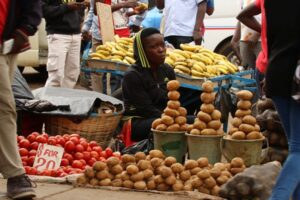In a recent appeal to President Bola Tinubu, Mr. Olatunbosun Oyintiloye, a chieftain of the All Progressives Congress (APC), highlighted the critical issue of high food prices and its impact on the Nigerian population. With millions of Nigerians living below the poverty line and facing extreme economic hardship, urgent intervention is necessary to address the growing hunger crisis. This article explores the repercussions of rising food prices and emphasizes the need for immediate action to alleviate the suffering of the Nigerian people.

Oyintiloye’s appeal sheds light on the dire situation faced by many Nigerians who are grappling with hunger. The United Nations predicts that by 2030, 82 million Nigerians, equivalent to 64% of the population, may face food insecurity. The National Bureau of Statistics (NBS) data further reveals that food inflation reached a record high of 40.66% in May, surpassing the previous month’s increase. This alarming trend is indicative of the challenges faced by ordinary citizens in accessing basic food items.
The soaring prices of common household food items are pushing them beyond the reach of the average Nigerian. Staples such as rice, beans, garri, spaghetti, and others have become increasingly unaffordable. The inflationary pressures on food prices have a cascading effect on the overall cost of living, exacerbating the already dire living conditions experienced by many Nigerians. The inability to access affordable and nutritious food directly impacts the health and well-being of individuals and families, perpetuating a cycle of poverty and deprivation.
Oyintiloye points out that despite Nigeria’s abundance of natural and human resources, successive governments have failed to drive the economy productively. Corruption and over-dependence on revenue from crude oil have hindered the country from establishing a self-sufficient and productive economy that benefits the masses. Addressing the root causes of the crisis requires a comprehensive approach that tackles corruption, promotes diversification of the economy, and empowers local farmers to enhance food production and reduce dependency on imports.
Government Intervention and Its Limitations:
While acknowledging President Tinubu’s efforts to address the situation through various intervention programs, Oyintiloye expresses concern that the impacts of these interventions have not effectively ameliorated the crisis. The government’s initiatives, though well-intentioned, have not been able to keep pace with the rising food prices and the growing needs of the population. It is crucial for the government to reassess and strengthen its intervention strategies to ensure they have a meaningful impact on alleviating hunger and reducing poverty.
To combat the hunger crisis and mitigate its impact on the Nigerian population, urgent action is needed. The government should consider implementing the following measures:
1. Enhancing agricultural productivity and supporting local farmers through subsidies, access to credit, and improved infrastructure.
2. Investing in irrigation systems and modern farming techniques to increase crop yields and reduce dependence on rain-fed agriculture.
3. Promoting and incentivizing the production and consumption of nutritious and locally-grown food.
4. Implementing effective price control mechanisms to prevent unjustified price hikes and ensure affordability for the average Nigerian.
The rising cost of food in Nigeria is exacerbating poverty, hunger, and the overall well-being of its citizens. Urgent action is needed to address this crisis and alleviate the suffering of millions of Nigerians. By addressing the root causes of the problem, strengthening government interventions, and implementing sustainable agricultural practices,
Nigeria can work towards a future where affordable and nutritious food is accessible to all. The government, in collaboration with stakeholders and international partners, must prioritize the fight against hunger and poverty to ensure a better quality of life for its people.




